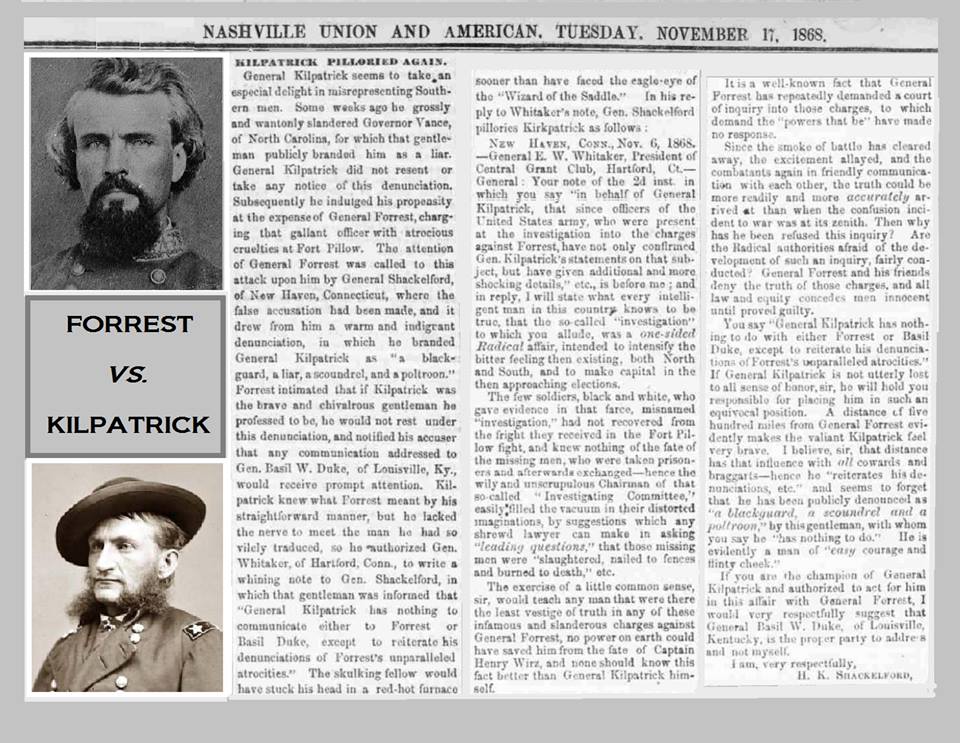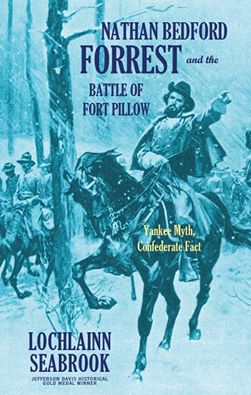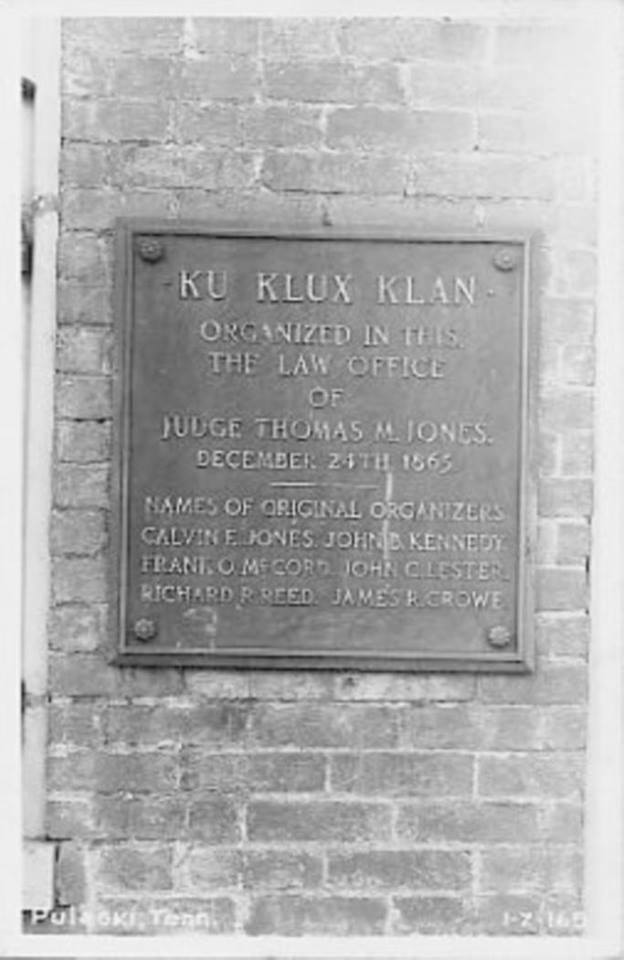
McCord, whose family owned the town's weekly newspaper, the Pulaski Citizen, printed mysterious-sounding notices of meetings and club activities. As other newspapers picked up his stories about the Klan, word spread and the organization grew.
In Defense of Gen. Forrest
Gen. Forrest is the subject of a very old hoax that has been around since the 1860s. There is no truth to the rumor that he was ever a 'leader of the kkk' or that he was a racist. When he was called to appear at the 1871 US Congressional Committee that investigated the charges of his rumored involvement with that group, he was building a railroad with most of his workers being blacks, whom he paid better wages than other companies were paying whites. He worked to promote civil rights for blacks, and for all men; his speech to the Pole Bearers is proof of that.
In 1871, Gen. Forrest was called before a congressional Committee. Forrest testified
before Congress personally over four hours .
Here's part of the transcript of Forrest's testimony to that
1871 hearing:
"The reports of Committees, House of Representatives, second session,
forty-second congress," P. 7-449. (see link
here )
"The primary accusation before this board is that Gen. Forrest was a founder of
The Klan, and its first Grand Wizard, So it shall address those accusations
first."
Forrest took the witness stand June 27th,1871. Building a railroad in Tennessee
at the time, Gen Forrest stated he 'had done more , probably than any other man,
to suppress these violence and difficulties and keep them down, had been
vilified and abused in the (news) papers, and accused of things I never did
while in the army and since. He had nothing to hide, wanted to see this matter
settled, our country quiet once more, and our people united and working together
harmoniously.'
Asked if he knew of any men or combination of men violating the law or
preventing the execution of the law: Gen Forest answered emphatically, 'No.' (A
Committee member brought up a 'document' suggesting otherwise, the 1868 newspaper
article from the "Cincinnati Commercial". That was their "evidence", a
news
article.)
Forrest stated ...any information he had on the Klan was information given to
him by others.
Sen. Scott asked, 'Did you take any steps in organizing an association or
society under that prescript (Klan constitution)?'
Forrest: 'I DID NOT' Forrest further stated that '..he thought the Organization
(Klan) started in middle Tennessee, although he did not know where. It is said I
started it.'
Asked by Sen. Scott, 'Did you start it, Is that true?'
Forrest: 'No Sir, it is not.'
Asked if he had heard of the Knights of the white Camellia, a Klan-like
organization in Louisiana,
Forrest: 'Yes, they were reported to be there.'
Senator: 'Were you a member of the order of the white Camellia?'
Forrest: 'No Sir, I never was a member of the Knights of the white Camellia.'
Asked about the Klan :
Forrest: 'It was a matter I knew very little about. All my efforts were
addressed to stop it, disband it, and prevent it....I was trying to keep it down
as much as possible.'
Forrest: 'I talked with different people that I believed were connected to it,
and urged the disbandment of it, that it should be broken up.'"
The following article appeared in the New York times June 27th, "Washington,
1871. Gen Forrest was before the Klu Klux Committee today, and his examination
lasted four hours. After the examination, he remarked than the committee treated
him with much courtesy and respect."
Gen. Forrest was NOT the 'first Grand Wizard of the KKK'. For the correct
information on that, here are the actual documented facts :
Actually, the "kuklos" was started in Pulaski, Tennessee, just before Christmas
1865, by six ex-Confederate officers, and was a sort of social club for
Confederate officers.
Nathan
Bedford Forrest had absolutely nothing to do with the founding of the Ku Klux
Klan.
And even within the history of the Klan, differences must be noted between the
Klan of the 1860s and the Klan of today.
The KKK that was reorganized in 1915 had a reputation as a bigoted and
sometimes violent organization, fueled by hate and ignorance and thriving on
fear and intimidation. But that wasn't always the case. The original KKK of the
1860s was organized as a fun club, or social club, for Confederate veterans. Many historians agree that if a YMCA had been available in the town of Pulaski,
Tenn., the KKK might never have existed. It was also a social aid and welfare
society whose main purpose was to protect those who had been dispossessed by the
War, while helping maintain law and order during the so-called "Reconstruction".
Not only did this early kkk have thousands of Black members, there was an
all-black kkk chapter in Nashville at one time. (credit goes to Lochlainn
Seabrook for that documented info).
On Dec. 24, 1865, six young Confederate veterans met in the law office of Judge
Thomas M. Jones, near the courthouse square in Pulaski. Their names were James
R. Crowe, Calvin E. Jones, John B. Kennedy, John C. Lester, Frank O. McCord, and
Richard B. Reed. All had been CSA officers and were lawyers, except Kennedy and
McCord, who had each served as a private in the Confederate army. The meeting
resulted in the idea of forming a social club, an 1860s version of the VFW or
American Legion.
Notice, Gen. Forrest was not present at the founding meeting.
Their number quickly grew, and in meetings that followed, the men selected a
name based on the Greek word "kuklos" meaning circle, from which they derived
the name Ku Klux. Perhaps bowing to their Scotch-Irish ancestry, and to add
alliteration to the name, they included "clan," spelled with a K. And so, quite
innocently, a new social club called the Ku Klux Klan was created to provide
recreation for Confederate veterans.

McCord, whose family owned the town's weekly newspaper, the Pulaski Citizen,
printed mysterious-sounding notices of meetings and club activities. As other
newspapers picked up his stories about the Klan, word spread and the
organization grew.
The actual Grand Wizard of the KKK at that time
was former CSA General, George W. Gordon, a resident of Pulaski, Tennessee,
where the club was formed. He was often identified with the Klan and
personally claimed to have been involved with the group. His robes and
Klan regalia are in the Tennessee State Museum.
When the war ended, Forrest was virtually broke, having spent most of his
estimated pre-war fortune of $1.5 million outfitting his troops. He was spending
his time between business ventures in Memphis and his farm in Mississippi.
Organizations such as the Klan were farthest from his mind.
After the War, General Forrest made a speech to the Memphis City Council (then called the Board of Aldermen). In this speech he said that there was no reason that the black man could not be doctors, store clerks, bankers, or any other job equal to whites. They were part of our community and should be involved and employed as such just like anyone else. In another speech to Federal authorities, Forrest said that many of the ex-slaves were skilled artisans and needed to be employed and that those skills needed to be taught to the younger workers. If not, then the next generation of blacks would have no skills and could not succeed and would become dependent on the welfare of society. Forrest's words went unheeded. The Memphis & Selma Railroad was organized by Forrest after the war to help rebuild the South's transportation and to build the 'new South'. Forrest took it upon himself to hire blacks as architects, construction engineers and foremen, train engineers and conductors, and other high level jobs. In the North, blacks were prohibited from holding such jobs.
When Forrest was 'elected' Grand Wizard of the Klan in mid-1867 at the Maxwell
House Hotel in Nashville, he wasn't even in town. He was 'elected' in absentia. That
doesn't count as 'being elected'. The best scholarly research shows that Forrest never "led the Klan," he never
"rode with" the Klan, nor did he ever own any Klan paraphernalia. It
has been speculated by many that the reason for his name being submitted for the
election was partly a prank, and mostly to discredit him for his work toward
black equality such as his hiring practices for his railroad company.
Forrest was a civil rights pioneer.
So there you have it. There is no reason to think of Gen. Forrest with anything
but admiration and respect. If anyone still thinks badly of Gen. Forrest, that
is a reflection of their own bad character, and does not take away from Gen.
Forrest's outstanding contributions to humanity.
Always remember, the "kuklos" of the late 1860s wasn't even remotely like the
US-flag-waving racist mob of the early 20th century.
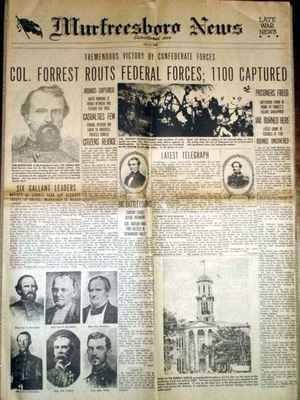
"HEADQUARTERS
FORREST'S CAVALRY,
Tupelo, June 25 [23], 1864.
GENERAL: I have the honor to
acknowledge the receipt (per flag of truce) of your letter of 17th
instant, addressed to Maj. Gen. S. D. Lee, or officer commanding
Confederate forces near Tupelo. I have forwarded it to General Lee with
a copy of this letter.
I regard your letter as discourteous to the commanding officer of this
department, and grossly insulting to myself. You seek by implied threats
to intimidate him, and assume the privilege of denouncing me as a
murderer and as guilty of the wholesale slaughter of the garrison at
Fort Pillow, and found your assertions upon the ex parte testimony of
your friends, the enemies of myself and country.
I shall not enter into the discussion, therefore, of any of the
questions involved nor undertake any refutation of the charges made by
you against myself; nevertheless, as a matter of personal privilege
alone, I unhesitatingly say that they are unfounded and unwarranted by
the facts. But whether these charges are true or false, they, with the
question you ask as to whether negro troops when captured will be
recognized and treated as prisoners of war, subject to exchange, &c.,
are matters which the Government of the United States and Confederate
States are to decide and adjust, not their subordinate officers.
... It is not the policy nor the interest of the South to destroy the
negro--on the contrary, to preserve and protect him--and all who have
surrendered to us have received kind and humane treatment.
Since the war began I have captured many thousand Federal prisoners, and
they, including the survivors of the Fort Pillow massacre (black and
white), are living witnesses of the fact that with my knowledge or
consent, or by my order, not one of them has ever been insulted or in
any way maltreated.
You speak of your forbearance in not giving to your negro troops
instructions and orders as to the course they should pursue in regard to
Confederate soldiers that might fall into their (your) hands, which
clearly conveys to my mind two very distinct impressions. The first is
that in not giving them instructions and orders you have left the matter
entirely to the discretion of the negroes as to how they should dispose
of prisoners; second, an implied threat to give such orders as will lead
to "consequences too fearful for contemplation." In confirmation of the
correctness of the first impression (which your language now fully
develops), I refer you most respectfully to my letter from the
battle-field of Tishomingo Creek and forwarded you by flag of truce on
the 14th instant. As to the second impression, you seem disposed to take
into your own hands the settlements which belong to, and can only be
settled by, your Government, but if you are prepared to take upon
yourself the responsibility of inaugurating a system of warfare contrary
to civilized usages, the onus as well as the consequences will be
chargeable to yourself.
Deprecating, as I should do, such a state of affairs, determined as I am
not to be instrumental in bringing it about, feeling and knowing as I do
that I have the approval of my Government, my people, and my own
conscience, as to the past, and with the firm belief that I will be
sustained by them in my future policy, it is left with you to determine
what that policy shall be--whether in accordance with the laws of
civilized nations or in violation of them.
I am, general, yours, very respectfully,
N. B. FORREST,
Major-General.
(From the OFFICIAL RECORDS
WAR OF THE "REBELLION")
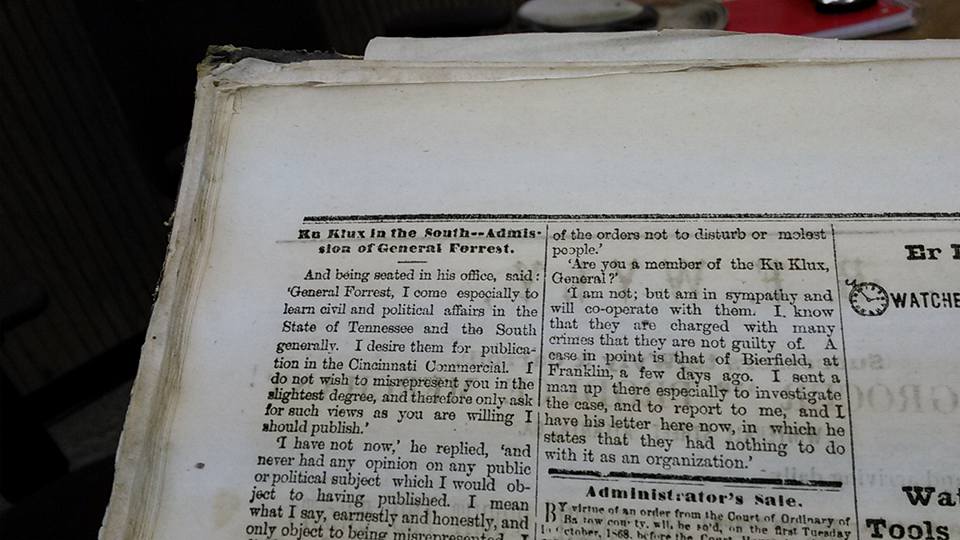
Forrest's Speech to the Pole Bearers
Forrest (1821-1877) was a famous Southern military leader, a brilliant strategist and a gentleman who made his mark in what Southerners call the War of Northern Aggression.
To paint every general on the losing side as a racist simply because you don't like the South is a travesty that the facts of history will knock down time and time again.
Yes, Forrest was a great general in an unpopular war, but when the war ended, Forrest accepted the outcome and then sought reconciliation with those around him.
He worked diligently to rebuild the New South and earnestly to generate employment for black Southerners.
His leadership and character did not fade because the South had been defeated. Instead he used who he was, accepted the outcome, and used his fame and talents for others' good.
At an early convention of the Pole-Bearers, whose beginnings prefaced the NAACP, it was Forrest who was invited to speak. History records no disrespect at the meeting; instead both the Pole-Bearers and Forrest behaved with mutual respect and decorum. He was the guest speaker, and historically the first white invited to be the keynote speaker.
Forrest was asked because the group was said to have wanted to extend union and peace to others, but what happened in further actions was even more important.
On July 4, 1875 the event began with a young black woman, the daughter of a leader of the Pole-Bearers, offering him a small bouquet of flowers signifying the peace intended.
Forrest received the flowers and then spoke from his heart to the gathering. His actions and recorded words testify that this gentleman was in truth a civil rights advocate, a believer in the rights of all people.
Among the statements he made that day: "I came here with jeers of some white people who think what I am doing is wrong. We were born on the same soil, breathe the same air, live in the same land, and why should we not be brothers and sisters. I believe I can exert some influence ... and shall do all in my power to elevate every man and to depress none. I want to elevate you to take positions in law offices, in stores, on farms and wherever you are capable of going."
He apologized for having no formal speech, but continued, " Many things have been said about me that are wrong, and which black and white persons here who stood by me through the war can contradict."
"I feel that you are free men, I am a free man, and we can do as we please. I came here as a friend and whenever I can serve any of you I will do so. We have one union, one flag, one country; therefore, let us stand together. Although we differ in color, we should not differ in sentiment."
"Do your duty as citizens, and if any are oppressed, I will be your friend. I thank you for the flowers, and assure you that I am with you in heart and hand."
It should be noted that both black and white soldiers fought under Forrest against the North. Many were in attendance at this Memphis address. When Forrest's cavalry abdicated in May of 1865, the muster included 65 black soldiers. Forrest described those gentlemen as soldiers amid his finest.
Yes, Forrest was a Southern general whose war strategies were unmatched. Yes, the war that began over states rights brought forth a welcome transition to the civil rights we are so thankful for today.
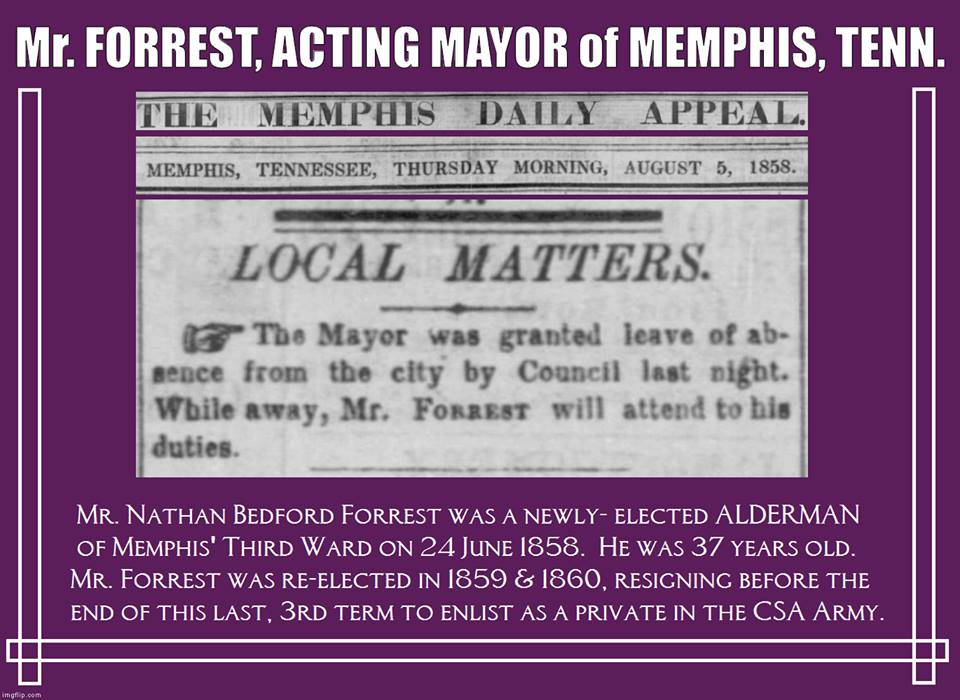
The transcript of the 1871 Congressional Committee can be found
here.
Pages 3 to 41 contain Gen. Forrest's testimony.
This link
connects to the record of Gen. Forrest's testimony concerning the 'ku klux' and
the state of affairs in portions of Georgia and Tennessee in which Gen. Forrest
had traveled. There are only two mentions of Fort Pillow in this link,
each time it is mentioned only in passing, not in depth.
We are still
looking for the rumored transcript of the committee in which Gen. Sherman supposedly questions Gen.
Forrest; it is probably an urban legend. Sherman was not a member of
Congress in 1871.
Many thanks to the Library of Congress for providing this link.
As for Fort Pillow, Gen. Forrest received many requests from residents around the fort asking him to come stop the Union soldiers from looting and pillaging the area and from committing atrocities (murders, rapes, random shootings, etc.) upon the people. When the battle started, many of the Union troops were drunk and refused to surrender when the battle was clearly lost. Afterward, Gen. Forrest had the most severely wounded Union soldiers transferred to a Union gunboat.
The Yankee newspapers created all sorts of lies to cover up the atrocities committed by the Union troops and their refusal to abide by the terms of surrender, so they invented tales of butchery by Forrest's troops. After learning all the facts of the battle and the Union atrocities committed in the weeks before the battle, one has to admire the restraint of the Confederates. The Union Congressional "investigation" of 1864 was a smear job, with "witnesses" who were later proven to have been over a hundred miles away at the time of the battle.
For a full accounting of the Fort Pillow battle, read "Confederate Victories At Fort Pillow" by Edward F. Williams III, published 1973 by Historic Trails, Inc., Memphis, TN and "The Campaigns of General Nathan Bedford Forrest and of Forrest's Cavalry", originally published in 1868 and reprinted in 1996. Both books can probably be found at Abes Books.
Here is a pretty good analysis of the Fort Pillow battle.
Another good article from the Armchair General
Good reference books:
"Nathan Bedford Forrest and the Battle Of Fort Pillow: The True Story" by
Lochlainn Seabrook
"Forrest! 99 Reason To Love Nathan Bedford Forrest" by Lochlainn Seabrook
... and there are several other good books about Forrest by Lochlainn Seabrook
at Sea Raven Press
Another interesting read: "Truth Of The War Conspiracy"
